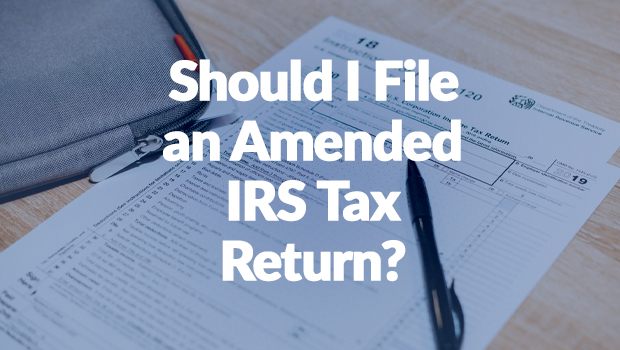The vast majority of taxpayers try to file an accurate tax return with the IRS. But sometimes, they realize they made a mistake in the tax filing. In other situations, circumstances change, so the previously filed return is no longer correct.
The need for a correction may be to avoid getting into trouble with the IRS. Although someone might want to change a previously filed return to get a bigger tax benefit or refund. Whichever situation applies to you, let’s examine amended tax returns, including when and why you might want to file one.
Why File an Amended IRS Tax Return?
You might think you need to file an amended return any time you want to make a change to your previously filed tax return, but that’s not necessarily true. Generally speaking, you’ll want to file an amended return if there’s been a change to your:
- Income
- Deductions
- Credits
- Filing status
- Claiming of a dependent
You typically don’t need to file an amended return if you discover a calculation error on your return or if you forgot to include a particular tax schedule or tax form. The IRS can usually correct any mathematical errors on your tax return and if they feel you should have included more information, such as a tax form, the IRS can send you a letter asking for that form or missing information.
How Do I File an Amended Return?
If you’re an individual who wants to amend an income tax return, you will use Form 1040-X, Amended U.S. Individual Income Tax Return. You can file this electronically or by mailing in a paper version of this form.
Keep in mind that if something has changed where you need to file an updated federal tax return, there’s a good chance that change applies to your state taxes as well. So if you’re filing Form 1040-X, you may also need to file an amended state tax return, too.
When Should I File an Updated Tax Return with the IRS?
If you’re filing an amended return to get a tax refund, you must file Form 1040-X within three years of the date you filed the return you’re trying to update or within two years of the date you paid the tax, whichever is later.
As for how early you should file an amended return, you should wait until the IRS has processed the return you’re amending.
How Long Will the IRS Take to Process the Amended Tax Return?
Processing times vary, but can easily take up to 20 weeks from the date you filed the amended return. To get a current picture of how busy the IRS is and how long it might take them to process your Form 1040-X, you can visit the IRS Operations: Status of Mission-Critical Functions page. To get the status of your amended return, you’ll need your Social Security Number, date of birth and ZIP Code.
Thinking About Filing an Amended Tax Return?
If you think there’s been a major mistake with a tax return you filed in the past or that a prior tax return could lead to you getting into serious financial or legal trouble, consider consulting a tax professional before filing your amended return. They can help you make the appropriate changes with Form 1040-X or take any other tax or legal steps to prevent further problems.
Kienitz Tax Law is here to help you with your tax issues. Schedule your FREE consultation today!

